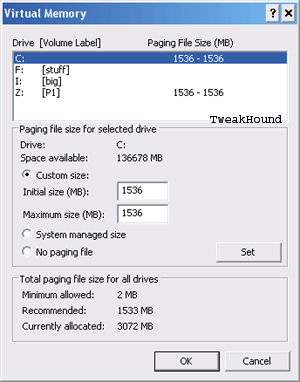The Page File
There is a lot of bad advice and misunderstanding on the web of how virtual memory (and thus the page file) works in XP. For those interested in further reading check out Understanding Virtual Memory , Virtual Memory in Windows XP, and How to configure paging files for optimization and recovery in Windows XP. The following recommendations are based on research, information gathered around the web, and personal experience dealing in a variety of configurations.
1. The average user is best served by LEAVING THE PAGE FILE ALONE. XP does an excellent job of managing the page file settings for most people.
2. For 99.999% of the configurations on the planet you need a page file. XP itself wants one and a number of programs out there do too. (Please don’t email me to argue this, I won’t respond. Find a forum to argue about it.)
3. The recommendations below are not designed to give you the highest scores on a synthetic benchmark but to give you the best overall performance for your system (including stability). The size of hard drives today are huge and making the page file a little larger than it “needs” to be hurts nothing and you’re covered if you’re ever doing something that requires more.
More good links:
RAM, Virtual Memory, Pagefile and all that stuff (short version at MS)
RAM, Virtual Memory, PageFile and all that stuff (full article)
Comparison of 32-bit and 64-bit memory architecture for 64-bit editions of Windows XP and Windows Server 2003
Action: Adjust Page File
Purpose: Performance. Stability.
More Info – see the links above
To adjust the page file:
Click on the Advanced tab > check both boxes that say “Programs” Under the Virtual memory section you should make adjustments here if your system can handle it. Click Change here. “Super geeks” will either:
A: Remove the page file from the drive the OS is on and make a separate partition at the beginning of a separate disk from the OS just for this (preferably on a different chain from that disk also). Use the same settings for the page file that XP had on the other drive (ram x 1.5 min, ram x 3 max). If you have several disks you can spread the page file out over them also. For those who wish to spread the page files out across multiple drives. XP will use the drive(s) that are least busy. Ensure that you set the page files on these drives large enough so that XP has enough room to do whatever it wants in each page file. This means setting each page file slightly larger than the amount of RAM installed. I do not like this option and use the next option instead.
***Microsoft and every expert I’ve read state that you should leave at least a small page file on the OS drive.
B. Keep the page file that is on the same partition that the OS is on and put a second page file on a separate partition at the beginning of a separate disk from the OS (preferably on a different chain from that disk also). I have mine set to: Page file on OS drive = memory x 1.5. Page file on separate partition/separate drive = memory x 1.5.
NOTE: The “1.5” recommendation is based on a ‘more than enough’ scenario. If you are the perfectionist type and want the perfect size page file for your machine then see here:
Below is an example of the setup in one of my machines.

